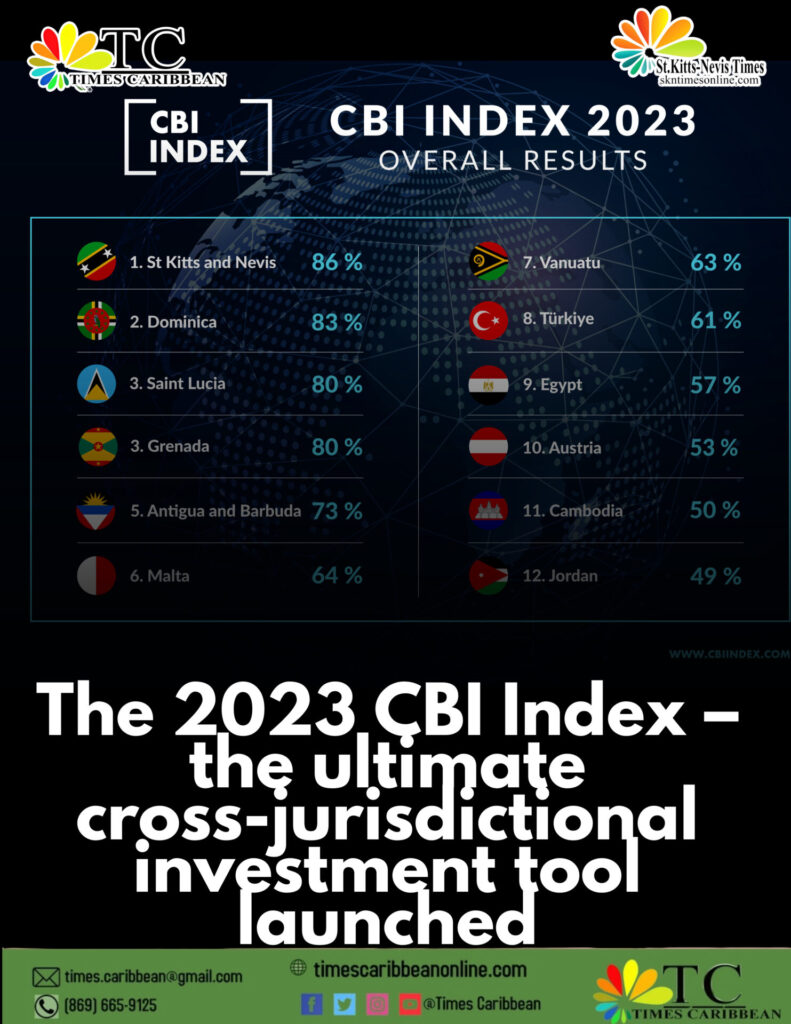The 2023 CBI Index – the ultimate cross-jurisdictional investment tool launched

14 September 2023_London_Today, the seventh edition of the CBI Index launched, providing captivating insights into the world’s top investment migration programmes in 2023.
From inception, the CBI Index, published in partnership with the Financial Times’ Private Wealth Magazine has been comprehensively ranking operational Citizenship by Investment (CBI) programmes for almost a decade – making it the ultimate cross-jurisdictional investment tool for global investors. The CBI Index is a trusted source both for those who wish to compare CBI programmes as a whole, and for those who wish to compare specific aspects of each programme.
The Index has evolved to become more than just a ranking tool, over the years it has established itself as a trusted voice in the industry, dissecting and gleaning important insights and trends that drive the investment migration sector. This year is no different, the industry has seen the biggest shake-up since the pandemic and investors require a legitimate sounding board with which to base their investment decisions.
“The CBI Index remains as one of the most important planning tools for global investors looking to include citizenship by investment products in their portfolios. It is well known that the CBI industry is a fragmented one, with different countries managing their own unique programmes, each with varying benefits, requirements, and regulations. Consequently, it can be challenging for investors to evaluate the relative merits of each programme. The purpose of the CBI Index, therefore, is to bring value to the CBI industry by providing a data-driven and practical tool for appraising programmes and facilitating the decision-making process for individuals considering them,” says James McKay, creator of the CBI Index and independent research consultant with expertise in global trend analyses.
The CBI Index assesses the performance and appeal of CBI programmes across a diverse range of indicators and measures by isolating factors — or ‘pillars’ — that measure programme features and the desirability of different jurisdictions. The pillars have been chosen for their relevance and comprehensiveness of measurement, and include:
- Standard of Living
- Freedom of Movement
- Minimum Investment Outlay
- Mandatory Travel or Residence
- Citizenship Timeline
- Ease of Processing
- Due Diligence
- Family
- Certainty of Product
The intricate combination of benchmarking, statistical analysis, and comparative investigation is what makes the CBI Index the number one tool for cross-jurisdictional planning for investors looking to set up their businesses, grow their assets and even find a new home for their families in different markets.
Caribbean nations still retain top spots
This year, St Kitts and Nevis took the coveted top spot, beating 11 other nations with active CBI programmes including Antigua & Barbuda, Austria, Cambodia, Dominica, Egypt, Grenada, Jordan, Malta, Saint Lucia, Türkiye and Vanuatu.
The Caribbean nations of St Kitts and Nevis, Dominica, Grenada, Saint Lucia and, Antigua and Barbuda took the top five spots in the 2023 CBI Index, indicating once again that the Caribbean has the most attractive CBI programmes in the world.
Despite global industry-wide challenges, St Kitts and Nevis took first place at 86 per cent and scored top marks in almost all pillars, cementing itself once again as a leader in the industry. Each of the nine pillars is scored out of a maximum of ten points and St Kitts and Nevis got full marks for Mandatory Travel or Residence, Ease of Processing, Due Diligence and Certainty of Product.
Dominica took second place, at 83 per cent and attained full marks for Minimum Investment Outlay, Mandatory Travel or Residence and Ease of Processing.
Grenada and Saint Lucia shared third place 80 per cent, while Antigua and Barbuda took fifth place, at 73 per cent.
Increased global scrutiny requires agile solutions
This year marked one of the most eventful for the investment migration industry, thanks to the pressures from the United States, United Kingdom, and European Union, exercising their clout in requiring CBI nations to prove that their programmes are indeed not providing a gateway for illicit characters.
Political pressure to suspend CBI programmes has caused much anxiety in the industry – threatening the existence of many programmes which are crucial in channelling much needed foreign direct investment to small island nations.
St Kitts and Nevis retained its top position in the due diligence category as it is the country leading the way in strengthening the legislative framework for its Programme, closing all loopholes relating to real estate investment and development projects. The St Kitts and Nevis Programme stands as one of the most regulated in the industry, showcasing the twin-island’s seriousness when it comes to the integrity of its offering.
Despite external pressures, it must be noted, Dominica was the first Caribbean nation to implement all ‘Six Principles’ agreed upon with the United States at the Roundtable held in February 2023. The ‘Six Principles’ include mandatory interviews for applicants aged 16 years and older and the revocation of passports from citizens who were dishonest in their applications.
Other nations in the Caribbean have followed suit, taking an agile and collaborative approach in responding to the global West.
CBI Index, still the most trusted cross-jurisdictional planning tool
The CBI Index has been published annually for seven years and remains as the most trusted source for global investors looking to expand their portfolios through citizenship by investment.
All 12 CBI programmes are measured according to nine pillars with reliance being placed on official sources and data publications from institutions of the highest international standing, as well as on the specialised input of industry experts, whose contributions and responses were used to obtain and interpret both qualitative and quantitative data used in the construction of the CBI Index.
In the 2023 CBI Index, the Freedom of Movement Pillar measures the relative strength of each country’s citizenship on the basis of three equally weighted factors: the number of destinations to which a country’s passport allows travel without restriction; the number of prime business hubs to which it provides access; and the degree to which a given citizenship provides settlement rights in other nations.
The Standard of Living Pillar is a measure of the level of wealth, comfort, and material goods offered by the 12 CBI jurisdictions under assessment. This pillar is vital to those who yearn to relocate and to secure a prosperous and fulfilling lifestyle as well as for those wanting to take advantage of local business opportunities or seeking additional geographical diversification for their assets.
The Minimum Investment Outlay Pillar measures one of the most practical and foremost considerations of CBI: how much capital is required for the investor to become an eligible applicant for the programme of their choosing.
The Mandatory Travel or Residence Pillar examines the travel or residence conditions imposed on applicants both before and after the granting of citizenship. Often busy with running a business or international travel, global citizens have little time to fulfil minimum stay requirements.
The Citizenship Timeline Pillar looks at the average time taken for citizenship to be secured by the applicant. The time at which application forms and supporting documentation are processed, and
the steps involved in approving an application, vary between programmes. Therefore, a thorough inspection of applicable laws, regulations, and policies was made to determine the official processing times mandated by each jurisdiction.
The Ease of Processing Pillar measures the end-to-end complexity of the CBI application process. In some jurisdictions, the application process can be a labour-intensive and painstaking task that is time-consuming for the applicant; in others, it is streamlined, and the applicant receives clear directives on how to proceed.
The Due Diligence Pillar, one of the most important, focuses on each nation’s commitment to ensuring that their programme remains transparent and effective at evaluating potential candidates for citizenship. It is, therefore, a measure of each programme’s integrity.
The Family Pillar measures the extent to which investors can obtain citizenship for their immediate and extended family. The CBI Index recognises that the rise of increasingly complex family relationships is driving investors to seek programmes that allow for a more diverse range of family members to be included under a primary application. While most CBI programmes provide for the inclusion of spouses and minor children, only a handful of countries do so for adult children and extended family.
The Certainty of Product Pillar encompasses a range of factors that measure a programme’s certainty across five different dimensions: longevity, popularity and renown, stability, reputation and adaptability. With the CBI industry currently in a state of flux amid a tightening regulatory landscape, it is more important than ever to provide investors with a means of differentiating a programme’s relative robustness.
ENDS
For more information, visit https://cbiindex.com/ or email info@cbiindex.com

Leave a comment
You must be logged in to post a comment.